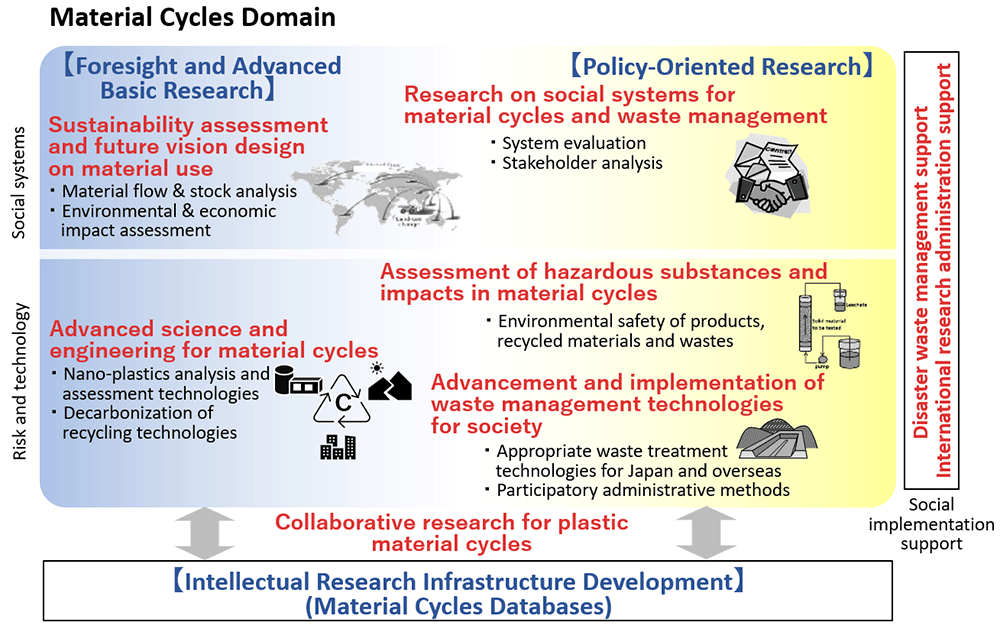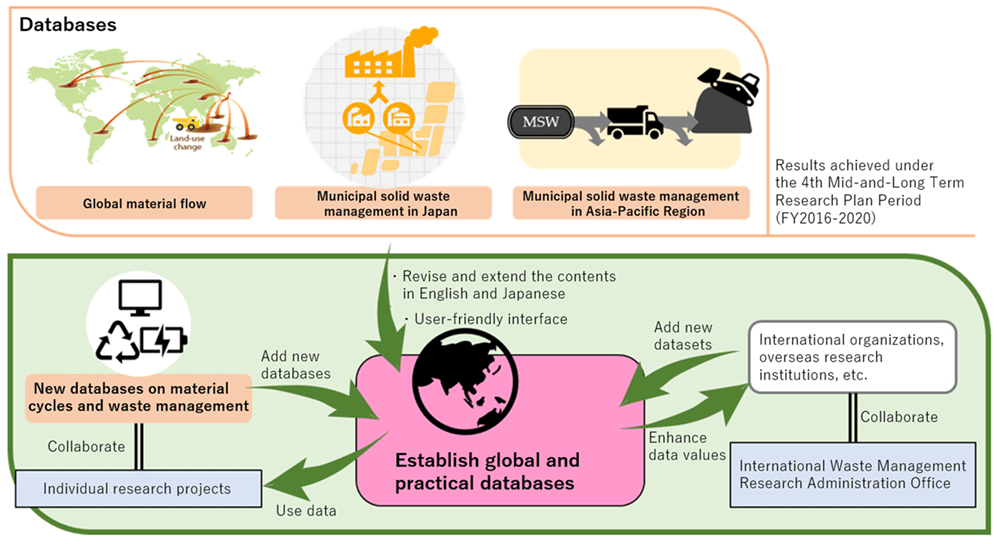Material Cycles Domain
Under the Fifth Mid-and-Long Term Research Plan (FY2021-FY2025), the Material Cycles Division conducts the following research activities.
- Assessment of material flows and stocks and their environmental impacts throughout life cycle from resource to waste in terms of current status and future situation; and proposing appropriate management methods for the material cycles that contribute to reduction of environmental burden and improvement of resource efficiency
- Development of technologies and systems for circular material use, proper waste treatment and disposal, and environmental remediation; and adaptation of these technologies and systems to the conditions of developing countries

Material Cycles Research
◎ Research areas
- Research on social systems and policies for material cycles
- Sustainability assessment and future vision design on material use
- Research on advanced science and engineering to support sustainable material cycles
- Measurement, testing, and evaluation of hazardous or valuable substances
- Waste management engineering research on technology advancement and adaptation
- Development of databases on material cycles and waste management through international cooperation
◎ Collaborative research
◎ Environmental emergency management
◎ International research administration
- Research on social systems and policies for material cycles
-
Our society faces challenges such as a declining and aging population, decarbonization, and an increasingly diverse lifestyle. In response to these changes, social systems that support proper waste management and sound material cycles must also change. In this research, we conduct social surveys, case studies, material flow analysis, model simulation, policy evaluation, stakeholder analysis, and so on. Our aim is to support target setting and strategic policy formulation on national and local levels, provide solutions to maintaining waste treatment systems and advancing circular systems, and develop methods for understanding the dynamics of chemical substances in the processes of waste treatment and material cycles.
- Sustainability assessment and future vision design on material use
-
In this research, we work on specifying and designing institutions for production and consumption systems that enable sustainable material use at multiple scales. Our approach to these issues includes modelling and analysing material flows/stocks and assessing the risk and criticality of materials, with a focus on environmental, economic and social impacts. We also develop data visualisation methods to assist diverse stakeholders in understanding sustainable material use.
- Research on advanced science and engineering to support sustainable material cycles
-
This research aims to provide advanced science and engineering solutions to the environmental problems that are foreseen in material cycles in near future by taking an approach that integrates chemical and material analysis; risk assessment; and chemical and environmental engineering. With consideration of creating a decarbonized society and ensuring safety, this research establishes analysis and assessment methods for nano-plastics and develops carbon cycle technologies. These fundamental knowledge and technologies support core technologies for sustainable material cycles and regional circular economy. The research pursues collaboration with other institutions to contribute to various environmental policies, and to implement the developed technologies in the society.
- Measurement, testing, and evaluation of hazardous or valuable substances
-
This research focuses on the following themes with the aim to create a sound material-cycle society in harmony with the environment.
- Clarification of emissions and worker exposure status of particulate matters such as microplastics and asbestos
- Elucidation of behavior of new POPs* and POPs candidates in product lifecycles
- Assessment of hazard and resource potential of metals and other substances contained in waste incineration residues
- Standardization of testing methods for evaluating environmental safety quality of recycled materials in construction
- Development of fundamental technologies for enhancing green infrastructure function by using recycled materials
*POPs: Persistent Organic Pollutants
- Waste management engineering research on technology advancement and adaptation
-
This research focuses on development of advanced technologies and systems that contribute to improving sanitary conditions and environmental safety of the material cycles and waste management technologies in Japan. We also promote application of Japanese technologies as well as adaptation of overseas technologies to developing countries in Asia and other regions. The research areas include waste logistics control; identification of optimal urban metabolic systems for Asia; development of proper technologies for treatment and recycling of waste and domestic wastewater; and promotion of efficiency improvement and adaptation of municipal services through local resident participation.
- Development of databases on material cycles and waste management through international cooperation
-
This research focuses on the following activities.
- Developing, revising, and extending the contents of databases on material cycles and waste management in Japan as well as in developing countries
- Making the interface of the databases user-friendly both in Japanese and English
- Enhancing global and practical values of the databases in collaboration with international organizations and overseas research institutions

- Plastic material cycles research
-
Plastics affect our environment in various ways at different stages of their life cycle from extraction of crude oil, their main raw material, to production, consumption, recycling and disposal of plastic products. Plastic production and incineration emit carbon dioxide (CO2) contributing to the climate change. When not collected properly, used plastics are discharged into the environment, partially degraded into microplastics, and may affect marine ecosystems and fish species they host, which is becoming a serious concern. We will find appropriate ways to monitor and evaluate these environmental impact of plastics from a broad perspective, and devise technological and social systems that can reduce the environmental impacts, in collaboration with researchers from a wide range of fields beyond the material cycles domain.
- Environmental emergency management
(Environmental Emergency Management Office ) -
Environmental Emergency Management Office provides technical assistance to enhance treatment, disposal and recycling of disaster waste and to improve management of hazardous chemical substances and asbestos-containing materials that have a risk of spreading after disaster events. The support areas include pre-disaster preparedness planning and capacity development training at local level and supporting post-disaster response of disaster-stricken areas. The Office coordinates with research programs and projects including the Environmental Emergency Research and Resilience Program and implements various other activities contributing to the society based on accumulated data and scientific knowledge in close collaboration with national and local governments as well as relevant academic institutions.
- International waste management research administration
(International Waste Management Research Administration Office ) -
International Waste Management Research Administration Office supports implementation of international research projects in the Division with the aim of promoting interdisciplinary joint research on material cycles at international level. Its support areas include creation of a project team, monitoring and management, and dissemination of research results. Through building collaborative relationships and systems with international organizations and municipalities in other countries, the Office promptly identifies needs for specific research areas and involvement of experts from these disciplines. These activities are expected to increase opportunities for substantial contribution to policy-making in this field. The Office facilitates effective dissemination of the research results from the projects through organization of international events, and publication of academic papers, reports, and policy recommendations. It also promotes utilization of digital products such as databases and application software. In order to ensure social implementation of research results, the Office serves as the Division’s focal point to support international standardization activities, publication of various guidelines as well as technical cooperation in infrastructure export.


